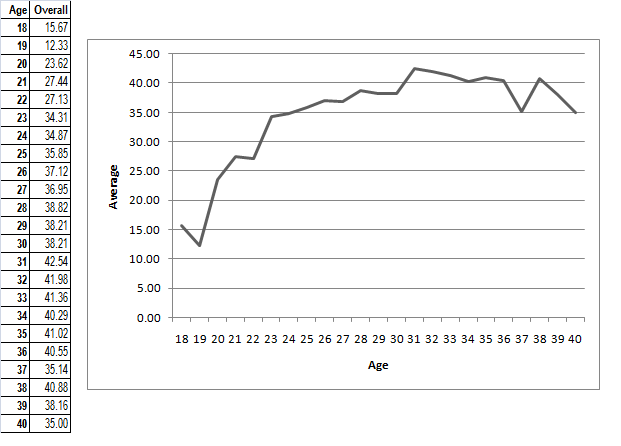I get incredibly frustrated when people constantly tell me that age is just a number, and that there is every reason why Pakistan should keep picking batsmen at ages at which their foreign counterparts are dropped forever.
Pakistan has played 7 away Tests since January 2019. That provides a huge sample size, especially when you consider the old adage that "an old player is just one bad series away from the chop".
I have used current ages. I have left out Sarfraz Ahmed as he is not a frontline batsman - even though I included Shadab, so I am being charitable. I am being even more charitable by leaving out Iftikhar Ahmed on the basis of his questionable age. I counterbalanced that by excluding Fakhar Zaman, whose Test career was a terrible experiment.
Here are the numbers by two simple age bands: 21-30 and Over 30.
The Over Thirty's
Azhar Ali (35): 159 runs at 12.23
Asad Shafiq (34): 375 runs at 28.84
Fawad Alam (34): 0 runs at 0.00
Abid Ali (32): 96 runs at 32.00
Haris Sohail (31): 9 runs at 4.50
OVERALL - 639 runs in 32 innings at an average of 19.97
Aged 21-30
Shan Masood (30): 541 runs at 41.61
Mohammad Rizwan (28): 273 runs at 45.50
Babar Azam (25): 552 runs at 42.46
Imam-ul-Haq (24): 151 runs at 18.88
Shadab Khan (21): 112 runs at 37.33
OVERALL - 1,629 runs in 44 innings at an average of 38.79
These figures are extraordinary. The numbers are actually huge - well over 30 innings in each age range.
But Pakistan's batsmen over the age of 30 literally score 48.52% fewer runs per innings than the guys aged under 30.
If there is a legitimate role for senior batsmen the numbers should be the other way round. In theory, only elite veterans are retained whereas some of the younger batsmen - such as Imam-ul-Haq - are of lower quality and are discarded.
But what we actually see is that the "senior batsmen" are a dead weight, a burden on the team who cannot even average 20 between them, even across over 30 innings.
Pakistan's batsmen aged 21 to 30 are doing all the heavy lifting, scoring all the runs, while the seniors simply put the team in a sequence of losing positions.
Pakistan has played 7 away Tests since January 2019. That provides a huge sample size, especially when you consider the old adage that "an old player is just one bad series away from the chop".
I have used current ages. I have left out Sarfraz Ahmed as he is not a frontline batsman - even though I included Shadab, so I am being charitable. I am being even more charitable by leaving out Iftikhar Ahmed on the basis of his questionable age. I counterbalanced that by excluding Fakhar Zaman, whose Test career was a terrible experiment.
Here are the numbers by two simple age bands: 21-30 and Over 30.
The Over Thirty's
Azhar Ali (35): 159 runs at 12.23
Asad Shafiq (34): 375 runs at 28.84
Fawad Alam (34): 0 runs at 0.00
Abid Ali (32): 96 runs at 32.00
Haris Sohail (31): 9 runs at 4.50
OVERALL - 639 runs in 32 innings at an average of 19.97
Aged 21-30
Shan Masood (30): 541 runs at 41.61
Mohammad Rizwan (28): 273 runs at 45.50
Babar Azam (25): 552 runs at 42.46
Imam-ul-Haq (24): 151 runs at 18.88
Shadab Khan (21): 112 runs at 37.33
OVERALL - 1,629 runs in 44 innings at an average of 38.79
These figures are extraordinary. The numbers are actually huge - well over 30 innings in each age range.
But Pakistan's batsmen over the age of 30 literally score 48.52% fewer runs per innings than the guys aged under 30.
If there is a legitimate role for senior batsmen the numbers should be the other way round. In theory, only elite veterans are retained whereas some of the younger batsmen - such as Imam-ul-Haq - are of lower quality and are discarded.
But what we actually see is that the "senior batsmen" are a dead weight, a burden on the team who cannot even average 20 between them, even across over 30 innings.
Pakistan's batsmen aged 21 to 30 are doing all the heavy lifting, scoring all the runs, while the seniors simply put the team in a sequence of losing positions.
Last edited by a moderator:








